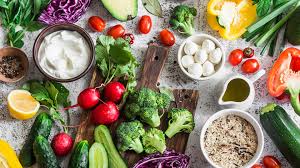
Multiple studies have indicated a link between diet and nutrition and the mental health of a person. Now a new study has said that tweaking your diet even for a brief period can help relieve symptoms of depression. The study has indicated that a shift in dietary habits of young adults may be an effective strategy to alleviate symptoms of depression. Clinically, depression is defined as a disorder that is characterised by persistently low mood and a loss of interest in daily activities, which may or may not cause impairment in daily life. There is a lack of clarity as to whether depression is a result of poor dietary habits or that it drives a person to have a poor diet.
The results of the radomised controlled trial were published in a study report titled, "A brief diet intervention can reduce symptoms of depression in young adults" in the journal PLOS One. The study was aimed at determining whether or not young adults with depression could derive benefits of a shift in their diets for a period of three weeks. Additionally, they wanted to know whether the participants could stick to a dietary intervention for the prescribed period. The study was conducted with the participation of 76 young adults aged between 17 and 35. All the participants had between moderate to high levels of depression and all of them had diets rich in sugar, saturated fats and processed foods.
Also Read: 25 Signs of Depression in Teenagers: Don't Ignore The Problem
The participants were divided into two groups- "diet change" group and"regular diet" group. The participants were tested for levels of depression, mood and anxiety disorders as well as for logical and reasoning abilities at the beginning and end of the study. The people in the diet change group were encouraged to stick to a healthier diet by promising them a gift card. The people in the diet change group showed significant improvement in depression, anxiety and stress scores at the end of the three-week study. On the other hand, there was no difference in depression scores in the other group that stuck to their regular diet. The study was conducted by researchers at the Macquarie University in Australia.

MBBS Addiction Psychiatrist Adolescent And Child Psychiatrist 14 Years Experience, Pune
Depression is a most common diagnosis in mental illness. Normally 50 to 60 percent of the people have this problem. If we did not do anything according to our desire, we would be sad for some time but it cannot be called a disease because it is natural. If depression arises and there is obstruction in our daily activities, then it can be called ailment.There are two parts that can be carried out both physically and outside the body
Physical: Depression occurs when there is more physical illness (eg TB, diabetes, hypertension, sexual ailment)
Outside the body: Constant stress, Constant failure, failure to social and domestic expectations.
There are some different sections in treatment of depression. There are listed below:
Counseling
Psychotherapy (Changes in the thinking and behavior of the patient).
Medication
Shock therapy
Below is the list of major symptoms related to Depression.
Feeling continuously sad in the mind.
Feeling impaired.
Decrease or decrease of sleep.
Loss of appetite or more.
Consideration of constant suicide.
Constant fatigue.
Prepare the feeling of undergrowth.
Irritability in young children.
Reduces the speed of physical and mental work.
Speaking low in the house.
Not paying attention to own cleanliness.
Not participating in the dialogue.
He/she is unable to work day to day.
Thinking of negative thoughts.
Loss of life and lack of sense of life.
Too much chatter.
Understand yourself as very important and big.
Too much expense, more to God-God, less need of sleep, Irritation.
Having sexual problems: Acute recurrence, Feeling less rigid. Other marital disadvantages.
As you have suffered from a major illness, constantly going to the doctor, taking a test, still worry and fear about the illness in mind.
Inability to slow down memory due to old age (Diagnostic symptoms).
Depression can wreak havoc in anyone’s life. It not only brings relentless hopelessness, but can also alter the life of a person. The National Institute of Mental Health (NIMH) reveals that more than 7% of young adults suffer from depression without their knowledge.
The cardinal symptoms of depression include feeling sad or disinterested in his or her surroundings for most of the time during the day. This may happen with or without nay stressor. Depression is also characterised by changes in day to day routines like having lack of sleep or more sleep, loss of appetite or eating more than needed, not getting happiness of previously pleasurable activities, getting annoyed and irritated easily, having abrupt mood swings, having feelings of helplessness, hopelessness, worthlessness, having death wishes and ideas for committing suicide etc.
If a person deals with the below mentioned symptoms for more than once a week, it is wise to visit a psychiatrist in order to treat it.
Eating irregularities: Loss of appetite is very common in those suffering from depression. A person might find himself withdrawn most of the time. This results in loss of interest in cooking or eating. Too many negative thoughts can curb hunger, resulting in weakness. On the other hand, depression can also lead to overeating. Affinity towards caffeine, chocolates, and ice cream dramatically increases. Studies have shown that these food items can give a soothing feeling. This being said, they are also responsible for weight gain in a person in a very short span of time.
Sleeping irregularities: A depressed person might find himself sleeping too much or too little. The disengagement from daily lives and sudden energy drop makes a person fatigued for the better half of the day, resulting in more sleep. This also serves as an escape mechanism for many. There is also the other lot who can hardly sleep due to depression. Irrational thinking and a sense of vengeance can cause this problem. This is a far worse problem. Lack of minimum amount of sleep can disturb the body’s internal clock, resulting in fatigue and tiredness.
Frequent agitation: If your friends complain of frequent snapping and agitation from your end, you might be suffering from depression. A load of heavy emotion results into frequent mood swings and force a person to behave irrationally. The sense of understanding and empathy tends to take a back seat and gets replaced by irritation and pain during this phase. A person can find himself on the edge with small and little things.
Challenge in concentrating: Forgetting a deadline or losing focus in work is a common tendency witnessed if faced with depression. Concentrating on a job becomes a major challenge. Since the mind is preoccupied with negative thoughts, a person portrays risky behaviour and poor decision-making. Reiteration of the same thoughts can make concentration extremely challenging for a person suffering from depression.
Hard to enjoy a hobby: If a person finds it difficult to enjoy things he previously loved doing, he might be suffering from depression. Depression makes it difficult for a person to seek pleasure in fun activities. It creates a vicious cycle of despair and loneliness. Isolation from any company is what a patient of depression longs for.
One of the major pitfalls of modern professional as well as personal life is stress. With obesity and bad diet, stress completes the unholy trinity of the three pronged problems which contributes to many modern lifestyle related disorders. Even if you control obesity and diet through lifestyle changes, stress is inherent in our everyday life and mostly is not in your control.
However, Ayurveda has some great methods through, which you can limit or minimize stress and limits its effect on your mind, body and soul.
Ayurveda - The holistic approach to stress
Ayurveda has been around for thousands of years and is thus, a great tool to fight or reduce many of the physical and mental ailments that afflict you. Ayurveda’s approach at busting stress is thus, very well rounded. These methods help keep your mind still to reduce stress and also reduce the ill effects of stress on your body. Some of the elements of this holistic diet are mentioned below:
1. Change your diet: Stress creates craving for unhealthy food, which is either very spicy or has a lot of processed sugar or fat. It is a temporary fix, which is again required when the next bout of stress hits, resulting in a pattern akin to addiction. One of the first steps is to break the cycle by changing eating habits. Stress occurs as a reaction to adversities in the world and rather than food aggravating the vata, pitta and kapha doshas, it should pacify and balance them. Whole and healthy food is what you need in such a case and it can comprise of
Soups
Root vegetables
Stews
Simple foods such as rice or roti
Green vegetables among others
2. Drink herbs in form of beverages to reduce stress: There are many forms of Ayurvedic herbs, which can help combat stress. One natural response among many people when stressed is to consume coffee or tea in large quantities, which may actually aggravate the problem. Try drinking Ayurvedic herbs as tea, which have been specially formulated to combat stress and correct the unbalanced doshas within the body.
3. Try Aromatherapy: Incense sticks and other specially formulated aroma candles can be used to create a relaxing atmosphere in your home where you can sit and meditate while the pleasant aromas and the herbs within them can lower your stress level and act as a release point.
4. Abhyanga: This is a form of self-massage with the help of specially medicated herbal Ayurvedic oils. It helps the body by relaxing the muscles, lubricating connective tissues and also improving circulation. Abhyanga reduces stress within the body and keeps you calm and relaxed. This will help you to reduce stress and also handle it better on a daily basis.
5. Pranayama, yoga and exercise: One of the most effective tools to combat stress and improve your physiological condition is through yoga and pranayama. Pranayama in particular is one of the most effective methods to regulate multiple functions of the body and to ensure your mind stays still and calm. Certain yoga poses can also be emphasized on to ensure better stress relief. Also ensure that you diligently follow your exercise routine daily as it is proven to be one of the most effective ways of combatting stress.
6. Herbs: Certain herbs can be used as medications, which can restore the balance of doshas. Sometimes, stress is caused due to internal problems rather than incitement from the outside world. Some of the herbs that can be used in medicated combinations in such cases are triphala, ashwagandha and brahmi. However, it is best to consult with an Ayurvedic practitioner who can prescribe tailor made medications for you.
Depression is a very common phenomenon in contemporary times. It mostly affects those in their teenage and even those who are in their early thirties. Depression can be caused due to many reasons and must be treated quickly to prevent it from turning into a chronic illness with other side effects. Common symptoms of depression include less socialising, less talking with people and sitting at home or locked behind doors for long duration. At times, one even reduces the intake of food and remains in an agitated mood for a long period of time. When it becomes severe cases, medicines need to be administered to the patients to bring them out of their depression.
The interesting part of this condition is that the patient sometimes knows that he/she is suffering from depression and should try to get out of it.
Homeopathy for Depression and Anxiety
Homeopathy is one of the most popular holistic systems of medicine. The selection of remedy is based upon the theory of individualization and symptoms similarity by using holistic approach. This is the only way through which a state of complete health can be regained by removing all the sign and symptoms from which the patient is suffering. The aim of homeopathy is not only to treat depression and anxiety but to address its underlying cause and individual susceptibility. As far as therapeutic medication is concerned, several medicines are available for depression treatment that can be selected on the basis of cause, condition, sensation and modalities of the complaints. For individualized remedy selection and treatment, the patient should consult a qualified homeopathic doctor in person. Some of the commonly indicated homeopathic medicines are listed here:
1.Aurum Metallicum- This medicine helps recover from deep-seated depression. The patient requiring this medicine is likely to have lost interest in life. There is a sense of loathing for life, lack of joy, loss of smile, loss of hope. He may have seen a very hectic and even successful career; and due to some triggers, there would be a U-turn and the person falls into deep valley of depression.
2.Manganese- This metal medicine has ample of gloominess, depression and sadness.
Here are some of the tips and tricks of coping with depression:
1.Overcome your thoughts with positivity: When in depression, one feels lethargic, is overcome by negative thoughts and cannot focus on doing anything. This needs to be challenged and battled with. During this time, you need to repeatedly convince yourself that there will good and bad times and there is always a way to deal with it. The bad phase would disappear just as it had come, and there is no point sulking on it now. Don’t let the negativity lead to more depression, as a healthy person still lives inside you.
2.Get fresh air daily: Going out for a walk or even sitting in the balcony to get some fresh air and morning sunlight can do wonders when you are suffering from depression. Light slowly eats away the darkness in you and helps you see the positive side of things.
3.Eat healthy food: There is a tendency to either give up on food or to eat a lot of junk food like pizza, chocolate and ice cream during this phase. This must be avoided. What is seen as depression eating is actually binge eating and can have serious consequences on your health and weight. Instead, healthy and regular meals should be eaten and meals should not be skipped at all.
4.Stay connected: You must stay connected with people, even if it means bringing a forced smile on your face. This can do wonders in helping you cope with your depression.












